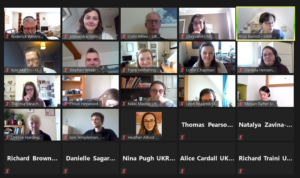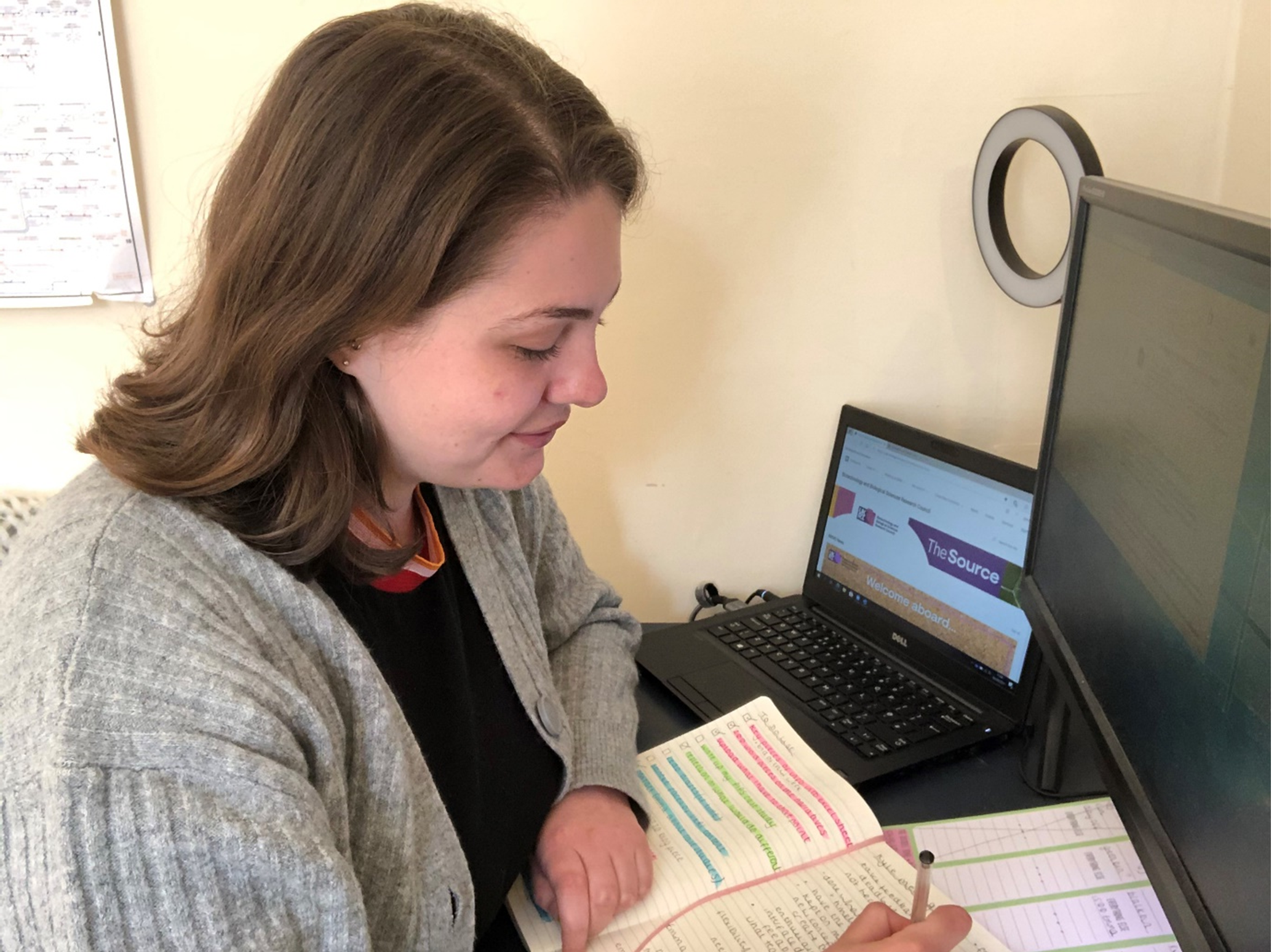Alex Holmes, a 4th year PhD student at the University of Leeds, undertook her PIPS placement remotely at the BBSRC. This is the major research funder for the biosciences in the UK. She worked in the Frontier Bioscience team, which is part of the Research Strategy and Programmes domain.
What did you do?
I was brought into the Frontier Bioscience team at BBSRC to find narratives to demonstrate the legacy of genomics funding by the BBSRC. This involved data collection by looking through the data collected on different grants and their outputs over the years and following these impacts through time and by interviewing key academic members of the communities I was focused on. I also worked with the Strategic Planning Evidence and Engagement team to identify potential case studies, and the Communications team to find routes for dissemination.
Day to day my tasks involved gathering data and evidence to support different narratives going from grants 20+ years ago to the research happening now, and identifying the key milestones along this process. This involved using tools such as Gateway to Research, Dimensions, internal databases (Siebel and OBIEE), as well as interviewing key members of the communities I was researching. Following this, I liaised with the communication and content teams and began writing up the narratives I had identified, as well as 200-word summaries. This involved creating Frontiers messages around frontier bioscience and its importance, as well as presenting the genomics messages from each piece and linking them to the wider UKRI and BBSRC strategy.
I also had the opportunity to sit in on a grant panel and see behind the scenes. I was responsible for monitoring 6 pre-panel discussion boards and removing conflicted panel members throughout the meeting. I have written up this experience into a blog post for the Leeds Postgraduate Review.
I was also able to meet with many of the different teams in BBSRC to get an idea of all their different processes and functions. In addition to the BBSRC meetings, I met with members of the central UKRI communications and content teams to understand their role.
What made you want to do that particular placement?
I chose this particular placement as I was interested in research-adjacent careers, such as those in a research council or funding body. I also have a strong interest in science communication and public engagement, and this placement offered both of these things and so seemed very suited to the skills and experiences I wanted to get from the PIPS programme. I also wanted to be challenged in the ways that I do science communication. Usually I focus on my own area or interesting papers in that area; the move to genomics and research I wasn’t familiar with, as well as having to present the information in a different way, was very exciting to me.
I also found when I spoke to the team during my interview that they were very willing to support my interest in these areas, and I felt very encouraged that they would enable me to gain new skills and make the most of the placement, as well as wanting me to create high quality content for their team.
How did you go about finding and planning your PIPS?
I applied to 2 PIPS opportunities, one at the ABPI and one with the BBSRC. I found these opportunities through the WR DTP newsletter and website. Both of these required a formal application with a CV and cover letter followed by an interview. I spoke to both of the organisations prior to applying to introduce myself and fully understand the project I would be working on.
I was invited to interview for both. The ABPI paid for me to come to their offices in South Kensington, London, where I had to do a short presentation and interview as well as a tour of their department. I found that they had several PIPS opportunities and that they liked me, but had a better fit for the particular opportunity I had applied to and offered me another, which involved designing a curriculum for students in Surrey.
The BBSRC interview took place over Zoom and despite technical difficulties (the motion sensor lights kept turning off on me!) I felt very engaged with the interviewers and the idea of this placement was much more exciting than the ABPI opportunities. I got the sense that I would fit in with their team and would be supported to make the most of the placement. They got in touch to offer me the place and I accepted.
I was originally due to start on the 18th May 2020, but due to lockdowns this was postponed. My PIPS supervisor was incredibly responsive to my questions about the situation and kept in touch with me near monthly from May until December to keep me in the loop for when the placement might be able to go ahead. I was then able to start remotely in January 2021 (almost a whole year since I originally interviewed). I was really impressed by this level of communication, and it let me get to know my supervisor during this time and generally cemented my feelings that this was a team that I would get on with and work well in.
What have you gained from doing your PIPS?
I think the main thing I have gained from my PIPS is insight. Prior to the placement, I saw the BBSRC as only a bioscience funder and the organisation paying for my studentship, but this placement has opened my eyes to all of the other parts of the machine that is BBSRC. For example, I had the opportunity to sit in on a grant panel and understand the mechanisms for funding, I was able to meet with the heads of the different departments – from strategy to funding and delivery, I also got to understand how the BBSRC and UKRI sits at the interface of government and academia. I think one of the things that really struck me was how much of the organisation was dedicated to research and enabling science, despite not being in the lab. I really enjoyed getting to see all of these different aspects.

I also gained skills, for example being able to do literature and grant-based research, but on a more high level than would be required in academia, developing narratives and legacies of grants and then distilling the comms messages each narrative needed to highlight, collaborating with different teams and researching an area I was not familiar with prior to my placement. In addition to these, I interviewed key academics working in the genomics topic areas I had identified, and this was a whole new skill set to develop, as I had never conducted an interview before.
I also strengthened my pre-existing communication skills by writing up my pieces and summarising them to different teams. It was a nice challenge to take my science communication skills and apply them to a completely different area with different requirements and messages.
How would you sum up your PIPS experience?
To draw a parallel with the research I was exposed to, I would describe my PIPS as “blue skies research”, i.e. curiosity-driven research with no known “real-world” applications.
I started my PIPS knowing that I was curious about research-adjacent work, and I had questions about how my skill set might fit into an organisation like the BBSRC, but I was not sure of how these experiences might be applied to my PhD or future career choices when I first started.
And, just like blue skies research, I discovered all sorts of tangible and intangible things that I could not have anticipated before starting. Tangible deliverables such as my narratives on the genomics legacy and improvements in skills, but also intangible pieces such as a better understanding of the research landscape in the UK and careers I might want to pursue in future. I was also granted a large amount of flexibility in what I worked on and what experiences I had throughout the process and was able to tailor the questions I was asking and refine my personal and professional objectives for the placement throughout.
It really was a brilliant experience and I have got so much more out of it than I could have dreamed at the beginning.
What advice would you give to other PGRs about PIPS?
Ask questions of the organisation before you apply so you’re sure that it’s an experience you are interested in. Start looking and applying early so you can see what opportunities are out there and shop around for the ones that suit you best. Don’t count any off immediately because you can’t know exactly what you’ll get from each of them until you’re doing them. Also, prioritise working with a team that understands that this is a development and training opportunity for you and will give you flexibility and exposure to the organisation, rather than just restraining you to the specific project you have applied for.
Also, don’t be tempted to work on your PhD throughout the placement. It was a refreshing break for me and I feel excited to return to my research questions.

